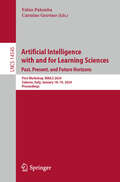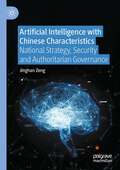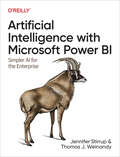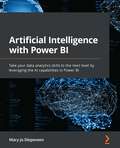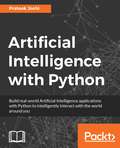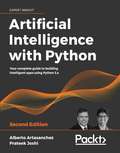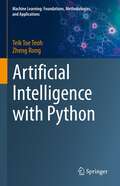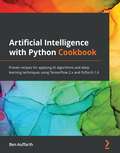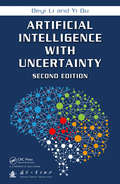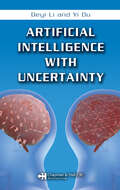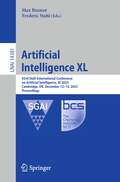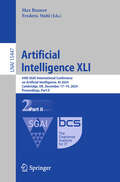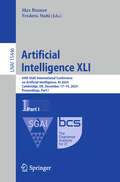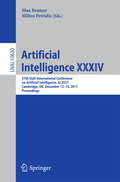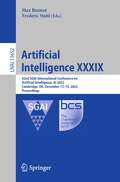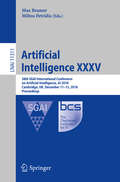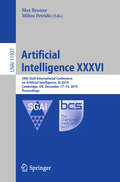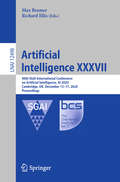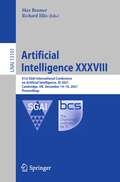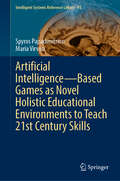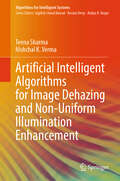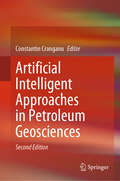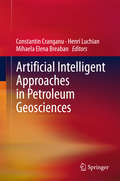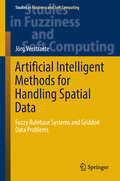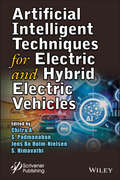- Table View
- List View
Artificial Intelligence with and for Learning Sciences. Past, Present, and Future Horizons: First Workshop, WAILS 2024, Salerno, Italy, January 18-19, 2024, Proceedings (Lecture Notes in Computer Science #14545)
by Fabio Palomba Carmine GravinoThis book constitutes the refereed conference proceedings of the First Workshop on Artificial Intelligence with and for Learning Sciences - Past, Present, and Future Horizons, WAILS 2024, held in Salerno, Italy, during January 18-19, 2024. The 14 full papers and 5 short papers presented in this book were carefully reviewed. The contributions present and discuss previous achievements, current challenges and solutions, and future perspectives concerned with the adoption of artificial intelligence methods and techniques in the context of learning sciences.
Artificial Intelligence with Chinese Characteristics: National Strategy, Security and Authoritarian Governance
by Jinghan Zeng“This book provides the first book-lengthy study focusing on Artificial Intelligence (AI) with Chinese characteristics, in line with China’s open ambition of becoming an AI superpower by 2030. China’s unique domestic politics has developed distinct characteristics for its AI approach. By analysing national strategy, security and governance aspects of AI in China, this book argues that China’s AI approach is sophisticated and multifaceted, and it has brought about both considerable benefits and challenges to China. First, many characterize China’s AI approach as a nationally concerted top-down geopolitical strategy to advance Beijing’s unified objective. This book argues that this view is mistaken. It shows that China’s AI politics is largely shaped by economically rather than geopolitically motivated domestic stakeholders. In addition, China’s national AI plan is an upgrade of existing local AI initiatives to the national level, reflecting a bottom-up development. Thus, China’s AI strategy is more of a political manifesto rather than a concrete policy plan. The second part of the book discusses how the Chinese central government has been securitizing AI in order to mobilize local states, market actors, intellectuals and the general public. This security discourse is built on China’s historical anxieties about technology, regime security needs and the growing tension caused by great power competition. Despite its help in convincing domestic actors, however, this securitization trend may undermine key AI objectives. The third part of the book studies the Chinese governance approach to the use of AI. It argues that China’s bold AI practices are part of its broad and incoherent adaptation strategy to governance by digital means. AI is part of a digital technology package that the Chinese authoritarian regime has actively employed not only to improve public services but also to strengthen its authoritarian governance. While China’s AI progress benefits from its unique political and social environment, its ambitious AI plan contains considerable risks. China’s approach is gambling on its success in (a) delivering a booming AI economy, (b) ensuring a smooth social transformation to the age of AI, and (c) proving ideological superiority of its authoritarian and communist values. This book suggests that a more accurate understanding of AI with Chinese characteristics is essential in order to inform the debate regarding what lessons can be learnt from China’s AI approach and how to respond to China’s rise as the AI leader if not superpower.”
Artificial Intelligence with Microsoft Power BI: Simpler AI for the Enterprise
by Jen Stirrup Thomas J. WeinandyAdvance your Power BI skills by adding AI to your repertoire at a practice level. With this practical book, business-oriented software engineers and developers will learn the terminologies, practices, and strategy necessary to successfully incorporate AI into your business intelligence estate. Jen Stirrup, CEO of AI and BI leadership consultancy Data Relish, and Thomas Weinandy, research economist at Upside, show you how to use data already available to your organization.Springboarding from the skills that you already possess, this book adds AI to your organization's technical capability and expertise with Microsoft Power BI. By using your conceptual knowledge of BI, you'll learn how to choose the right model for your AI work and identify its value and validity.Use Power BI to build a good data model for AIDemystify the AI terminology that you need to knowIdentify AI project roles, responsibilities, and teams for AIUse AI models, including supervised machine learning techniquesDevelop and train models in Azure ML for consumption in Power BIImprove your business AI maturity level with Power BIUse the AI feedback loop to help you get started with the next project
Artificial Intelligence with Power BI: Take your data analytics skills to the next level by leveraging the AI capabilities in Power BI
by Mary-Jo DiepeveenLearn how to create your own AI model and consume it in your Power BI reports to gain better insights from your dataKey FeaturesLearn how to gain better insights from your data by applying different AI techniques within Power BISave time by creating machine learning models independently and integrating them within your BI reportsUnderstand how to combine Cognitive Services and Azure Machine Learning together with Power BIBook DescriptionThe artificial intelligence (AI) capabilities in Power BI enable organizations to quickly and easily gain more intelligent insights from unstructured and structured data.This book will teach you how to make use of the many AI features available today in Power BI to quickly and easily enrich your data and gain better insights into patterns that can be found in your data.You'll begin by understanding the benefits of AI and how it can be used in Power BI. Next, you'll focus on exploring and preparing your data for building AI projects and then progress to using prominent AI features already available in Power BI, such as forecasting, anomaly detection, and Q&A. Later chapters will show you how to apply text analytics and computer vision within Power BI reports. This will help you create your own Q&A functionality in Power BI, which allows you to ask FAQs from another knowledge base and then integrate it with PowerApps. Toward the concluding chapters, you'll be able to create and deploy AutoML models trained in Azure ML and consume them in Power Query Editor. After your models have been trained, you'll work through principles such as privacy, fairness, and transparency to use AI responsibly.By the end of this book, you'll have learned when and how to enrich your data with AI using the out-of-the-box AI capabilities in Power BI.What you will learnApply techniques to mitigate bias and handle outliers in your dataPrepare time series data for forecasting in Power BIPrepare and shape your data for anomaly detectionUse text analytics in Power Query EditorIntegrate QnA Maker with PowerApps and create an appTrain your own models and identify the best one with AutoMLIntegrate an Azure ML workspace with Power BI and use endpoints to generate predictionsWho this book is forThis artificial intelligence BI book is for data analysts and BI developers who want to explore advanced analytics or artificial intelligence possibilities with their data. Prior knowledge of Power BI will help you get the most out of this book.
Artificial Intelligence with Python
by Prateek JoshiBuild real-world Artificial Intelligence applications with Python to intelligently interact with the world around you About This Book • Step into the amazing world of intelligent apps using this comprehensive guide • Enter the world of Artificial Intelligence, explore it, and create your own applications • Work through simple yet insightful examples that will get you up and running with Artificial Intelligence in no time Who This Book Is For This book is for Python developers who want to build real-world Artificial Intelligence applications. This book is friendly to Python beginners, but being familiar with Python would be useful to play around with the code. It will also be useful for experienced Python programmers who are looking to use Artificial Intelligence techniques in their existing technology stacks. What You Will Learn • Realize different classification and regression techniques • Understand the concept of clustering and how to use it to automatically segment data • See how to build an intelligent recommender system • Understand logic programming and how to use it • Build automatic speech recognition systems • Understand the basics of heuristic search and genetic programming • Develop games using Artificial Intelligence • Learn how reinforcement learning works • Discover how to build intelligent applications centered on images, text, and time series data • See how to use deep learning algorithms and build applications based on it In Detail Artificial Intelligence is becoming increasingly relevant in the modern world where everything is driven by technology and data. It is used extensively across many fields such as search engines, image recognition, robotics, finance, and so on. We will explore various real-world scenarios in this book and you'll learn about various algorithms that can be used to build Artificial Intelligence applications. During the course of this book, you will find out how to make informed decisions about what algorithms to use in a given context. Starting from the basics of Artificial Intelligence, you will learn how to develop various building blocks using different data mining techniques. You will see how to implement different algorithms to get the best possible results, and will understand how to apply them to real-world scenarios. If you want to add an intelligence layer to any application that's based on images, text, stock market, or some other form of data, this exciting book on Artificial Intelligence will definitely be your guide! Style and approach This highly practical book will show you how to implement Artificial Intelligence. The book provides multiple examples enabling you to create smart applications to meet the needs of your organization. In every chapter, we explain an algorithm, implement it, and then build a smart application.
Artificial Intelligence with Python: Your complete guide to building intelligent apps using Python 3.x and TensorFlow 2, 2nd Edition
by Prateek Joshi Alberto ArtasanchezNew edition of the bestselling guide to artificial intelligence with Python, updated to Python 3.x and TensorFlow 2, with seven new chapters that cover RNNs, AI & Big Data, fundamental use cases, chatbots, and more. Key Features Completely updated and revised to Python 3.x, and TensorFlow 2 Seven new chapters that include AI on the cloud, RNNs and DL models, feature engineering, the machine learning data pipeline, and more New author with 25 years of experience in artificial intelligence across multiple industries and enterprise domains Book Description Artificial Intelligence with Python, Second Edition is an updated and expanded version of the bestselling guide to artificial intelligence using the latest version of Python 3.x and TensorFlow 2. Not only does it provide you an introduction to artificial intelligence, this new edition goes further by giving you the tools you need to explore the amazing world of intelligent apps and create your own applications. This edition also includes seven new chapters on more advanced concepts of Artificial Intelligence, including fundamental use cases of AI; machine learning data pipelines; feature selection and feature engineering; AI on the cloud; the basics of chatbots; RNNs and DL models; and AI and Big Data. Finally, this new edition explores various real-world scenarios and teaches you how to apply relevant AI algorithms to a wide swath of problems, starting with the most basic AI concepts and progressively building from there to solve more difficult challenges so that by the end, you will have gained a solid understanding of, and when best to use, these many artificial intelligence techniques. What you will learn Understand what artificial intelligence, machine learning, and data science are Explore the most common artificial intelligence use cases Learn how to build a machine learning pipeline Assimilate the basics of feature selection and feature engineering Identify the differences between supervised and unsupervised learning Discover the most recent advances and tools offered for AI development in the cloud Develop automatic speech recognition systems and chatbots Understand RNNs and various DL models Who this book is for The intended audience for this book is Python developers who want to build real-world Artificial Intelligence applications. Basic Python programming experience and awareness of machine learning concepts and techniques is mandatory.
Artificial Intelligence with Python (Machine Learning: Foundations, Methodologies, and Applications)
by Teik Toe Teoh Zheng RongEntering the field of artificial intelligence and data science can seem daunting to beginners with little to no prior background, especially those with no programming experience. The concepts used in self-driving cars and virtual assistants like Amazon’s Alexa may seem very complex and difficult to grasp. The aim of Artificial Intelligence in Python is to make AI accessible and easy to understand for people with little to no programming experience though practical exercises. Newcomers will gain the necessary knowledge on how to create such systems, which are capable of executing tasks that require some form of human-like intelligence. This book introduces readers to various topics and examples of programming in Python, as well as key concepts in artificial intelligence. Python programming skills will be imparted as we go along. Concepts and code snippets will be covered in a step-by-step manner, to guide and instill confidence in beginners. Complex subjects in deep learning and machine learning will be broken down into easy-to-digest content and examples. Artificial intelligence implementations will also be shared, allowing beginners to generate their own artificial intelligence algorithms for reinforcement learning, style transfer, chatbots, speech, and natural language processing.
Artificial Intelligence with Python Cookbook: Proven recipes for applying AI algorithms and deep learning techniques using TensorFlow 2.x and PyTorch 1.6
by Ben AuffarthWork through practical recipes to learn how to solve complex machine learning and deep learning problems using PythonKey FeaturesGet up and running with artificial intelligence in no time using hands-on problem-solving recipesExplore popular Python libraries and tools to build AI solutions for images, text, sounds, and imagesImplement NLP, reinforcement learning, deep learning, GANs, Monte-Carlo tree search, and much moreBook DescriptionArtificial intelligence (AI) plays an integral role in automating problem-solving. This involves predicting and classifying data and training agents to execute tasks successfully. This book will teach you how to solve complex problems with the help of independent and insightful recipes ranging from the essentials to advanced methods that have just come out of research.Artificial Intelligence with Python Cookbook starts by showing you how to set up your Python environment and taking you through the fundamentals of data exploration. Moving ahead, you'll be able to implement heuristic search techniques and genetic algorithms. In addition to this, you'll apply probabilistic models, constraint optimization, and reinforcement learning. As you advance through the book, you'll build deep learning models for text, images, video, and audio, and then delve into algorithmic bias, style transfer, music generation, and AI use cases in the healthcare and insurance industries. Throughout the book, you'll learn about a variety of tools for problem-solving and gain the knowledge needed to effectively approach complex problems.By the end of this book on AI, you will have the skills you need to write AI and machine learning algorithms, test them, and deploy them for production.What you will learnImplement data preprocessing steps and optimize model hyperparametersDelve into representational learning with adversarial autoencodersUse active learning, recommenders, knowledge embedding, and SAT solversGet to grips with probabilistic modeling with TensorFlow probabilityRun object detection, text-to-speech conversion, and text and music generationApply swarm algorithms, multi-agent systems, and graph networksGo from proof of concept to production by deploying models as microservicesUnderstand how to use modern AI in practiceWho this book is forThis AI machine learning book is for Python developers, data scientists, machine learning engineers, and deep learning practitioners who want to learn how to build artificial intelligence solutions with easy-to-follow recipes. You'll also find this book useful if you're looking for state-of-the-art solutions to perform different machine learning tasks in various use cases. Basic working knowledge of the Python programming language and machine learning concepts will help you to work with code effectively in this book.
Artificial Intelligence with Uncertainty
by Deyi Li Yi DuThis book develops a framework that shows how uncertainty in Artificial Intelligence (AI) expands and generalizes traditional AI. It explores the uncertainties of knowledge and intelligence. The authors focus on the importance of natural language – the carrier of knowledge and intelligence, and introduce efficient physical methods for data mining amd control. In this new edition, we have more in-depth description of the models and methods, of which the mathematical properties are proved strictly which make these theories and methods more complete. The authors also highlight their latest research results.
Artificial Intelligence with Uncertainty
by Deyi Li Yi DuThe information deluge currently assaulting us in the 21st century is having a profound impact on our lifestyles and how we work. We must constantly separate trustworthy and required information from the massive amount of data we encounter each day. Through mathematical theories, models, and experimental computations, Artificial Intelligence with U
Artificial Intelligence XL: 43rd SGAI International Conference on Artificial Intelligence, AI 2023, Cambridge, UK, December 12–14, 2023, Proceedings (Lecture Notes in Computer Science #14381)
by Max Bramer Frederic StahlThis book constitutes the refereed proceedings of the 43rd SGAI International Conference on Artificial Intelligence, AI 2023, held in Cambridge, UK, during December 12–14, 2023.The 27 full papers and 20 short papers included in this book are carefully reviewed and selected from 67 submissions. They were organized in topical sections as follows: Technical Papers: Speech and Natural Language Analysis, Image Analysis, Neural Nets, Case Based Reasoning and Short Technical Papers. Application Papers: Machine Learning Applications, Machine Vision Applications, Knowledge Discovery and Data Mining Applications, other AI Applications and Short Application Papers.
Artificial Intelligence XLI: 44th SGAI International Conference on Artificial Intelligence, AI 2024, Cambridge, UK, December 17–19, 2024, Proceedings, Part II (Lecture Notes in Computer Science #15447)
by Max Bramer Frederic StahlThis two-volume set, LNAI 15446 and LNAI 15447, constitutes the refereed proceedings of the 44th SGAI International Conference on Artificial Intelligence, AI 2024, held in Cambridge, UK, during December 17–19, 2024. The 36 full papers and 18 short papers presented in these two volumes were carefully reviewed and selected from 80 submissions. Part I includes papers from the Technical stream, whereas Part II includes papers from the Application stream. These volumes are organized into the following topical sections: - Part I: Neural nets; Deep learning; Large language models; Machine learning; Evolutionary and genetic algorithms; Knowledge management, Short Technical Papers. Part II: Machine vision; Evaluation of AI systems; Applications of machine learning; Other AI applications, Short Application Papers.
Artificial Intelligence XLI: 44th SGAI International Conference on Artificial Intelligence, AI 2024, Cambridge, UK, December 17–19, 2024, Proceedings, Part I (Lecture Notes in Computer Science #15446)
by Max Bramer Frederic StahlThis two-volume set, LNAI 15446 and LNAI 15447, constitutes the refereed proceedings of the 44th SGAI International Conference on Artificial Intelligence, AI 2024, held in Cambridge, UK, during December 17–19, 2024. The 36 full papers and 18 short papers presented in these two volumes were carefully reviewed and selected from 80 submissions. Part I includes papers from the Technical stream, whereas Part II includes papers from the Application stream. These volumes are organized into the following topical sections: - Part I: Neural nets; Deep learning; Large language models; Machine learning; Evolutionary and genetic algorithms; Knowledge management, Short Technical Papers. Part II: Machine vision; Evaluation of AI systems; Applications of machine learning; Other AI applications, Short Application Papers.
Artificial Intelligence XXXIV: 37th SGAI International Conference on Artificial Intelligence, AI 2017, Cambridge, UK, December 12-14, 2017, Proceedings (Lecture Notes in Computer Science #10630)
by Max Bramer Miltos PetridisThis book constitutes the proceedings of the 37th SGAI International Conference on Innovative Techniques and Applications of Artificial Intelligence, AI 2017, held in Cambridge, UK, in December 2017. The 25 full papers and 12 short papers presented in this volume were carefully reviewed and selected from 55 submissions. There are technical and application papers which were organized in topical sections named: machine learning and neural networks; machine learning, speech and vision and fuzzy logic; short technical papers; AI for healthcare; applications of machine learning; applications of neural networks and fuzzy logic; case-based reasoning; AI techniques; and short applications papers.
Artificial Intelligence XXXIX: 42nd SGAI International Conference on Artificial Intelligence, AI 2022, Cambridge, UK, December 13–15, 2022, Proceedings (Lecture Notes in Computer Science #13652)
by Max Bramer Frederic StahlThis book constitutes the proceedings of the 42nd SGAI International Conference on Innovative Techniques and Applications of Artificial Intelligence, AI 2022, which was held in Cambridge, UK, in December 2022.The 20 full papers and 11 short papers presented in this volume were carefully reviewed and selected from 40 submissions. The volume includes technical papers presenting new and innovative developments in the field as well as application papers presenting innovative applications of AI techniques in a number of subject domains. The papers are organized in the following topical sections: best technical paper; best application paper; AI for health and medicine; AI for scientific discovery and decision making; AI for industrial applications; feasibility studies of applied AI; and short papers.
Artificial Intelligence XXXV: 38th SGAI International Conference on Artificial Intelligence, AI 2018, Cambridge, UK, December 11–13, 2018, Proceedings (Lecture Notes in Computer Science #11311)
by Max Bramer Miltos PetridisThis book constitutes the proceedings of the 38th SGAI International Conference on Innovative Techniques and Applications of Artificial Intelligence, AI 2018, held in Cambridge, UK, in December 2018. The 25 full papers and 12 short papers presented in this volume were carefully reviewed and selected from 46 submissions. There are technical and application papers which were organized in topical sections named: Neural Networks; Planning and Scheduling; Machine Learning; Industrial Applications of Artificial Intelligence; Planning and Scheduling in Action; Machine Learning in Action; Applications of Machine Learning; and Applications of Agent Systems and Genetic Algorithms.
Artificial Intelligence XXXVI: 39th SGAI International Conference on Artificial Intelligence, AI 2019, Cambridge, UK, December 17–19, 2019, Proceedings (Lecture Notes in Computer Science #11927)
by Max Bramer Miltos PetridisThis book constitutes the proceedings of the 39th SGAI International Conference on Innovative Techniques and Applications of Artificial Intelligence, AI 2019, held in Cambridge, UK, in December 2019.The 29 full papers and 14 short papers presented in this volume were carefully reviewed and selected from 49 submissions. The volume includes technical papers presenting new and innovative developments in the field as well as application papers presenting innovative applications of AI techniques in a number of subject domains. The papers are organized in the following topical sections: machine learning; knowledge discovery and data mining; agents, knowledge acquisition and ontologies; medical applications; applications of evolutionary algorithms; machine learning for time series data; applications of machine learning; and knowledge acquisition.
Artificial Intelligence XXXVII: 40th SGAI International Conference on Artificial Intelligence, AI 2020, Cambridge, UK, December 15–17, 2020, Proceedings (Lecture Notes in Computer Science #12498)
by Max Bramer Richard EllisThis book constitutes the proceedings of the 40th SGAI International Conference on Innovative Techniques and Applications of Artificial Intelligence, AI 2020, which was supposed to be held in Cambridge, UK, in December 2020. The conference was held virtually due to the COVID-19 pandemic.The 23 full papers and 9 short papers presented in this volume were carefully reviewed and selected from 44 submissions. The volume includes technical papers presenting new and innovative developments in the field as well as application papers presenting innovative applications of AI techniques in a number of subject domains. The papers are organized in the following topical sections: neural nets and knowledge management; machine learning; industrial applications; advances in applied AI; and medical and legal applications.
Artificial Intelligence XXXVIII: 41st SGAI International Conference on Artificial Intelligence, AI 2021, Cambridge, UK, December 14–16, 2021, Proceedings (Lecture Notes in Computer Science #13101)
by Max Bramer Richard EllisThis book constitutes the proceedings of the 41st SGAI International Conference on Innovative Techniques and Applications of Artificial Intelligence, AI 2021, which was supposed to be held in Cambridge, UK, in December 2021. The conference was held virtually due to the COVID-19 pandemic.The 22 full papers and 10 short papers presented in this volume were carefully reviewed and selected from 37 submissions. The volume includes technical papers presenting new and innovative developments in the field as well as application papers presenting innovative applications of AI techniques in a number of subject domains. The papers are organized in the following topical sections: technical paper; machine learning; AI techniques; short technical stream papers; application papers; applications of machine learning; AI for medicine; advances in applied AI; and short application stream papers.
Artificial Intelligence—Based Games as Novel Holistic Educational Environments to Teach 21st Century Skills (Intelligent Systems Reference Library #93)
by Spyros Papadimitriou Maria VirvouThis book offers a visionary look at how AI can promote learning for modern skillsets by examining the fusion of AI, prosocial gaming, personalisation, ethics, and education. The book introduces the EPATHLO Suite, a novel AI platform that personalises both educational content and gameplay, creating tailor-made learning experiences and entertainment for each student. By blending personalised games with education, these AI-driven environments make learning more dynamic and enjoyable, while focusing on prosocial behaviour development, encouraging cooperation, empathy, and ethical understanding. It also provides roles for human teachers, as content creators of the EPATHLO Suite authoring tool. The book highlights the importance of twenty-first-century skills—such as critical thinking, collaboration, communication, and creativity—while also addressing ethical issues like data privacy (including GDPR compliance). It provides practical AI-driven solutions and reviews relevant literature, offering a comprehensive understanding of these interconnected fields. This book is an indispensable resource for those looking to explore these state-of-the-art topics. It is ideal for academics, researchers, students, educators, game designers, programmers, and professionals in the educational gaming industry who want to understand AI's role in shaping the future of education with games. Whether readers aim to enhance their classroom, develop new learning technologies, or better grasp the evolving technology of educational games with AI, this book offers valuable knowledge and practical tools for success.
Artificial Intelligent Algorithms for Image Dehazing and Non-Uniform Illumination Enhancement (Algorithms for Intelligent Systems)
by Nishchal K. Verma Teena SharmaThis book offers a detailed insight of artificial intelligence (AI) algorithms for image dehazing and non-uniform illumination enhancement. In this book, various image enhancement techniques under hazy and non-uniform illumination conditions are discussed. The book specifically provides a detail on how to approach image enhancement under different outdoor conditions using AI tools. The biggest benefit a reader would accrue is to get exposed to the various aspects one should take care of while working with digital images. The book also includes multiple inventions which were recently introduced by the authors for image enhancement and reviews the state of the art in respective subject matters.
Artificial Intelligent Approaches in Petroleum Geosciences
by Constantin CranganuThis book presents cutting-edge approaches to solving practical problems faced by professionals in the petroleum industry and geosciences. With various state-of-the-art working examples from experienced academics, the book offers an exposure to the latest developments in intelligent methods for oil and gas research, exploration, and production. This second edition is updated with new chapters on machine learning approaches, data-driven modelling techniques, and neural networks. The book delves into machine learning approaches, including evolutionary algorithms, swarm intelligence, fuzzy logic, deep artificial neural networks, KNN, decision tree, random forest, XGBoost, and LightGBM. it also analyzes the strengths and weaknesses of each method and emphasizes essential parameters like robustness, accuracy, speed of convergence, computer time, overlearning, and normalization. Integration, data handling, risk management, and uncertainty management are all crucial issues in petroleum geosciences. The complexities of these problems require a multidisciplinary approach that fuses petroleum engineering, geology, geophysics, and geochemistry. Essentially, this book presents an approach for integrating various disciplines such as data fusion, risk reduction, and uncertainty management. Whether you are a professional or a student, you can greatly benefit from the latest advancements in intelligent methods applied to oil and gas research. This comprehensive and updated book presents cutting-edge approaches and real-world examples that can help you in solving the intricate challenges of the petroleum industry and geosciences.
Artificial Intelligent Approaches in Petroleum Geosciences
by Constantin Cranganu Henri Luchian Mihaela Elena BreabanThis book presents several intelligent approaches for tackling and solving challenging practical problems facing those in the petroleum geosciences and petroleum industry. Written by experienced academics, this book offers state-of-the-art working examples and provides the reader with exposure to the latest developments in the field of intelligent methods applied to oil and gas research, exploration and production. It also analyzes the strengths and weaknesses of each method presented using benchmarking, whilst also emphasizing essential parameters such as robustness, accuracy, speed of convergence, computer time, overlearning and the role of normalization. The intelligent approaches presented include artificial neural networks, fuzzy logic, active learning method, genetic algorithms and support vector machines, amongst others. Integration, handling data of immense size and uncertainty, and dealing with risk management are among crucial issues in petroleum geosciences. The problems we have to solve in this domain are becoming too complex to rely on a single discipline for effective solutions and the costs associated with poor predictions (e. g. dry holes) increase. Therefore, there is a need to establish a new approach aimed at proper integration of disciplines (such as petroleum engineering, geology, geophysics and geochemistry), data fusion, risk reduction and uncertainty management. These intelligent techniques can be used for uncertainty analysis, risk assessment, data fusion and mining, data analysis and interpretation, and knowledge discovery, from diverse data such as 3-D seismic, geological data, well logging, and production data. This book is intended for petroleum scientists, data miners, data scientists and professionals and post-graduate students involved in petroleum industry.
Artificial Intelligent Methods for Handling Spatial Data: Fuzzy Rulebase Systems and Gridded Data Problems (Studies in Fuzziness and Soft Computing #370)
by Jörg VerstraeteThis book provides readers with an insight into the development of a novel method for regridding gridded spatial data, an operation required to perform the map overlay operation and apply map algebra when processing spatial data. It introduces the necessary concepts from spatial data processing and fuzzy rulebase systems and describes the issues experienced when using current regridding algorithms. The main focus of the book is on describing the different modifications needed to make the problem compatible with fuzzy rulebases. It offers a number of examples of out-of-the box thinking to handle aspects such as rulebase construction, defuzzification, spatial data comparison, etc. At first, the emphasis is put on the newly developed method, and additional datasets containing information on the underlying spatial distribution of the data are identified. After this, an artificial intelligent system (in the form of a fuzzy inference system) is constructed using this knowledge and then applied on the input data to perform the regridding. The book offers an example of how an apparently simple problem can pose many different challenges, even when trying to solve it with existing soft computing technologies. The workflow and solutions to solve these challenges are universal and may therefore be broadly applied into other contexts.
Artificial Intelligent Techniques for Electric and Hybrid Electric Vehicles
by Chitra A. P. Sanjeevikumar, Jens Bo Holm-Nielsen S. HimavathiElectric vehicles/hybrid electric vehicles (EV/HEV) commercialization is still a challenge in industries in terms of performance and cost. The performance along with cost reduction are two tradeoffs which need to be researched to arrive at an optimal solution. This book focuses on the convergence of various technologies involved in EV/HEV. The book brings together the research that is being carried out in the field of EV/HEV whose leading role is by optimization techniques with artificial intelligence (AI). Other featured research includes green drive schemes which involve the possible renewable energy sources integration to develop eco-friendly green vehicles, as well as Internet of Things (IoT)-based techniques for EV/HEVs. Electric vehicle research involves multi-disciplinary expertise from electrical, electronics, mechanical engineering and computer science. Consequently, this book serves as a point of convergence wherein all these domains are addressed and merged and will serve as a potential resource for industrialists and researchers working in the domain of electric vehicles.
